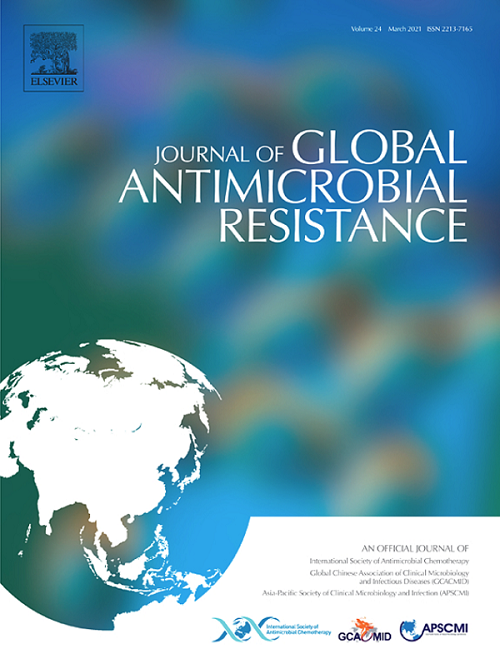Susceptibility of multidrug-resistant Escherichia coli and Klebsiella pneumoniae to oral antibiotics in Australia
IF 3.2
3区 医学
Q2 INFECTIOUS DISEASES
引用次数: 0
Abstract
Objectives
In Australia, resistance to β-lactam-class antibiotics in Enterobacterales has increased. This study aimed to identify potential oral treatments for these multidrug-resistant infections by investigating four β-lactam (mecillinam, tebipenem, sulopenem, and faropenem) and three non-β-lactam (fosfomycin, omadacycline, and delafloxacin) antibiotics, and to elucidate the genetic resistance mechanisms.
Methods
Seventy-four Escherichia coli and 24 Klebsiella pneumoniae, with extended-spectrum β-lactamase or plasmid-mediated AmpC β-lactamases genes, were isolated from New South Wales hospital patients in 2021. Minimum inhibitory concentrations (MICs) were determined using Clinical and Laboratory Standards Institute (CLSI) guidelines with agar dilution for fosfomycin and mecillinam, and broth microdilution for the remaining antibiotics. Multiplex polymerase chain reaction and whole genome sequencing (Illumina) confirmed bacterial resistance mechanisms.
Results
The E. coli were mostly susceptible to mecillinam (97%), and had low MIC90 to tebipenem, sulopenem, and faropenem (0.125 mg/L, 0.5 mg/L, and 4 mg/L). K. pneumoniae were mostly susceptible to mecillinam (96%), and had a low MIC90 to tebipenem and sulopenem, but higher MIC90 to faropenem (2 mg/L, 2 mg/L, and 8 mg/L). Moreover, the cases of E. coli were mostly susceptible to fosfomycin and omadacycline, but not delafloxacin (100%, 95%, and 16%); K. pneumoniae susceptibilities to these antibiotics were 92%, 50%, and 17%, respectively. Resistance mechanisms include tet(A) and ramR mutations for omadacycline; gyrA, parC, and qnr mutations for delafloxacin; and ompK36 gene deletions for fosfomycin, mecillinam, tebipenem, sulopenem, and faropenem.
Conclusions
The favourable results support the use of mecillinam, tebipenem, sulopenem, faropenem, fosfomycin, and omadacycline against multidrug-resistant E. coli. Mecillinam, sulopenem, and fosfomycin may be useful for multidrug-resistant K. pneumoniae in Australia.
澳大利亚多重耐药大肠杆菌和肺炎克雷伯菌对口服抗生素的敏感性。
目的:在澳大利亚,肠杆菌对β-内酰胺类抗生素的耐药性有所增加。本研究旨在通过研究4种β-内酰胺类抗生素(美西利南、替比培南、苏洛培南和法罗培南)和3种非β-内酰胺类抗生素(磷霉素、奥马达环素和德拉沙星),探索这些多重耐药感染的潜在口服治疗方法,并阐明遗传耐药机制。方法:从新南威尔士州医院2021年患者中分离到74株带有广谱β-内酰胺酶或质粒介导的AmpC β-内酰胺酶基因的大肠杆菌和24株肺炎克雷伯菌。最低抑菌浓度(MIC)采用临床和实验室标准协会的指导方针,用琼脂稀释法测定磷霉素和美西林,用肉汤微量稀释法测定其余抗生素。多重聚合酶链反应和全基因组测序(Illumina)证实了细菌的耐药机制。结果:大肠杆菌对美西利南最敏感(97%),对特比培南、苏洛培南和法罗培南(0.125mg/L、0.5mg/L和4mg/L)的MIC90较低。肺炎克雷伯菌对美西林南最敏感(96%),对特比培南和舒洛培南MIC90较低,对法罗培南(2mg/L、2mg/L和8mg/L) MIC90较高。大肠杆菌对磷霉素和奥马达环素最敏感,对德拉沙星不敏感(分别为100%、95%和16%);肺炎克雷伯菌对这些抗生素的敏感性分别为92%、50%和17%。耐药机制包括tet(A)和ramR突变;德拉沙星的gyrA、parC和qnr突变;磷霉素、美西林、替比培南、舒洛培南和法罗培南的ompK36基因缺失。结论:支持美西利南、替比培南、苏洛培南、法罗培南、磷霉素和奥马达环素对多重耐药大肠杆菌的应用。美西利南、苏洛培南和磷霉素可能对澳大利亚多重耐药肺炎克雷伯菌有用。
本文章由计算机程序翻译,如有差异,请以英文原文为准。
求助全文
约1分钟内获得全文
求助全文
来源期刊

Journal of global antimicrobial resistance
INFECTIOUS DISEASES-PHARMACOLOGY & PHARMACY
CiteScore
8.70
自引率
2.20%
发文量
285
审稿时长
34 weeks
期刊介绍:
The Journal of Global Antimicrobial Resistance (JGAR) is a quarterly online journal run by an international Editorial Board that focuses on the global spread of antibiotic-resistant microbes.
JGAR is a dedicated journal for all professionals working in research, health care, the environment and animal infection control, aiming to track the resistance threat worldwide and provides a single voice devoted to antimicrobial resistance (AMR).
Featuring peer-reviewed and up to date research articles, reviews, short notes and hot topics JGAR covers the key topics related to antibacterial, antiviral, antifungal and antiparasitic resistance.
 求助内容:
求助内容: 应助结果提醒方式:
应助结果提醒方式:


